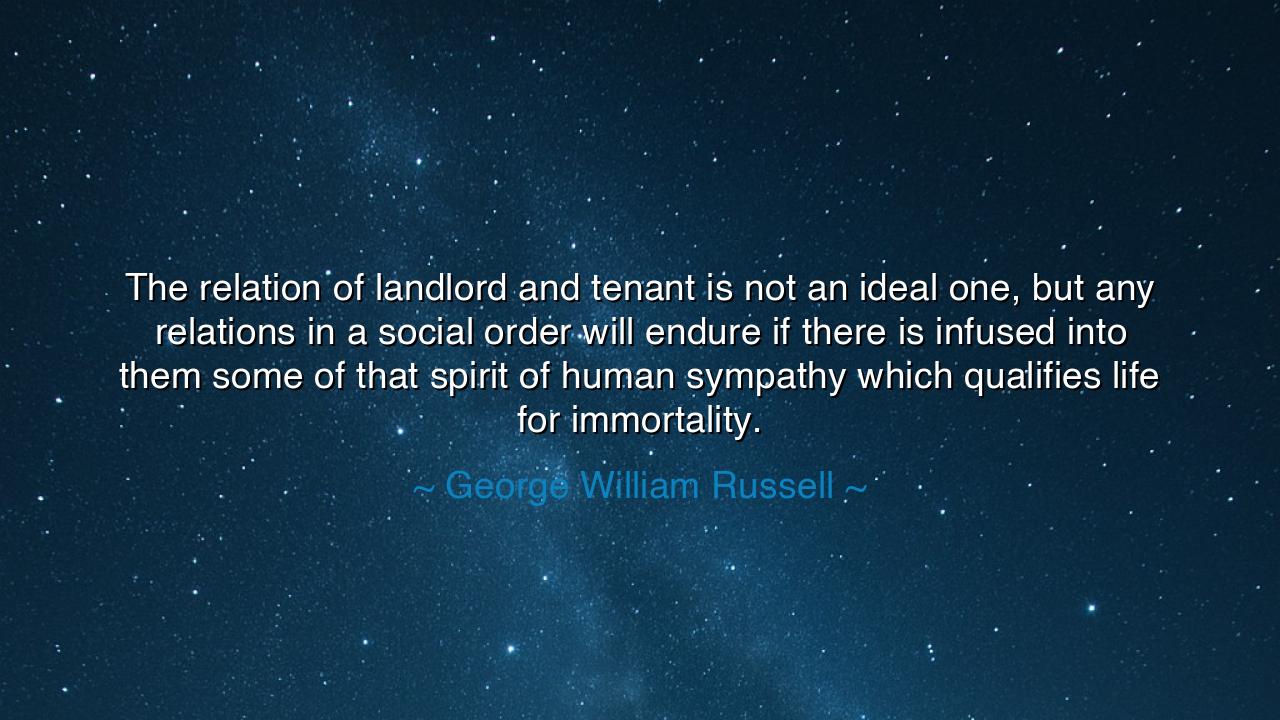
The relation of landlord and tenant is not an ideal one, but any
The relation of landlord and tenant is not an ideal one, but any relations in a social order will endure if there is infused into them some of that spirit of human sympathy which qualifies life for immortality.






Hear, O seekers of justice and harmony, the words of George William Russell, poet, mystic, and voice of Ireland’s troubled land. He proclaimed: “The relation of landlord and tenant is not an ideal one, but any relations in a social order will endure if there is infused into them some of that spirit of human sympathy which qualifies life for immortality.” In this saying lies not merely a reflection on rent and property, but a profound meditation on the endurance of society itself. For every order, however unequal or imperfect, may be softened and sanctified by the presence of sympathy, that divine bond which binds soul to soul.
Russell spoke out of the soil of Ireland, where the wounds of the landlord-tenant system were deep and bitter. The history of his people was marked by evictions, famine, and the long shadow of absentee landlords who saw the land as profit, not as life. In such a structure, exploitation seemed inevitable. Yet Russell, with the vision of a mystic, declared that even within such a flawed relation, there could be endurance if only human sympathy was present—if landlord saw tenant not as a tool, but as a brother; if tenant saw landlord not as an enemy, but as a fellow mortal bound by the same fragile breath.
History gives us examples of this truth. Recall Marcus Aurelius, emperor of Rome, whose rule spanned over vast lands and countless subjects. Though emperor and subject stood worlds apart, Marcus sought to temper power with compassion, writing in his Meditations that all men share reason and must be treated as kin. It was this infusion of sympathy that allowed his reign to be remembered as just, despite the vast inequalities inherent in empire. Where sympathy enters, even harsh hierarchies may be endured.
But where sympathy is absent, the fabric of society tears. The Irish Famine revealed this with terrible clarity. Landlords, indifferent to the suffering of their tenants, forced evictions even as hunger stalked the land. In that absence of sympathy, the social order collapsed into misery and death. And in their memory, we see Russell’s wisdom confirmed: power without compassion cannot endure; authority without empathy rots from within. Only when infused with the spirit that qualifies life for immortality—that is, love and sympathy—can human relations withstand the storms of time.
The deeper meaning of Russell’s words, then, is that every social order—be it of ruler and ruled, master and servant, employer and worker—must contain within it the breath of humanity. Systems, laws, and structures may bind people outwardly, but it is sympathy that gives endurance, dignity, and peace. Without it, the strongest empire will crumble. With it, even flawed systems can serve as bridges until better orders are born.
The lesson, O listener, is for all: in your dealings, whether you hold power or stand beneath it, let sympathy be the guiding force. If you are in authority, temper justice with mercy, for your strength is meaningless without compassion. If you are subject to another, remember their humanity also, for bitterness alone corrodes the soul. In every relationship—between nations, between neighbors, between families—it is the spirit of sympathy that transforms fleeting life into something that partakes of immortality.
Therefore, let Russell’s words endure as teaching: no relation, however imperfect, need be void of humanity. Seek always to infuse your dealings with compassion. For it is not the balance of wealth or the weight of law that gives life its eternal worth, but the sympathy we bear for one another, which makes even suffering endurable and transforms power into stewardship.
And thus, pass this down to future generations: the true foundation of society is not land, nor law, nor wealth, but sympathy. Without it, relations collapse into cruelty. With it, even the hardest bonds are softened, and life itself shines with the light of immortality.






AAdministratorAdministrator
Welcome, honored guests. Please leave a comment, we will respond soon